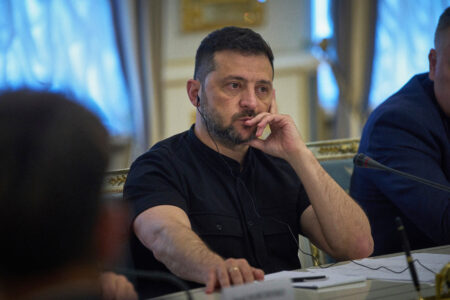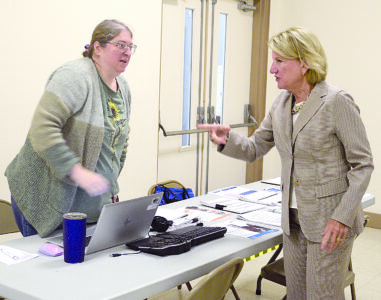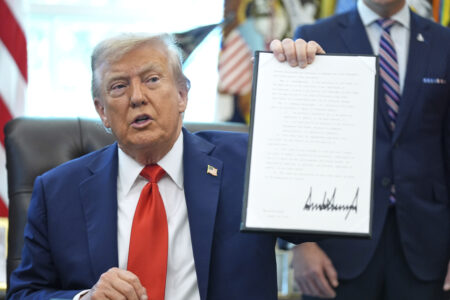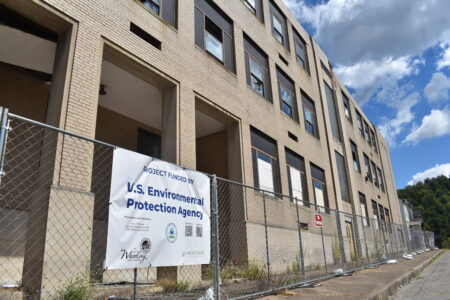West Virginia Circuit Judge Grants Motion To Combine Religious Vaccine Exemption Cases
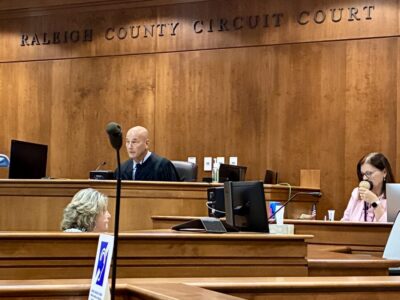
Fourteenth Judicial Circuit Judge Michael Froble, seen here during a previous hearing, ruled Monday afternoon in Raleigh County Circuit Court to consolidate two cases involving Gov. Patrick Morrisey’s executive order allowing for religious exemptions to the state’s compulsory immunization law and denying a stay while the Raleigh County preliminary injunction against county and state education officials is appealed to the West Virginia Supreme Court. (File Photo)
CHARLESTON — A Raleigh County judge agreed to consolidate two different cases raising questions about Gov. Patrick Morrisey’s executive order allowing religious exemptions from required vaccinations, but rejected a request for a stay while an appeal to the West Virginia Supreme Court of Appeals is pending.
Meanwhile, Morrisey and the nation’s top health official are challenging state lawmakers to codify a religious exemption to West Virginia’s compulsory immunization law for school-age children as soon as possible.
Fourteenth Circuit Judge Michael Froble issued rulings on several motions Monday afternoon in Raleigh County Circuit Court in Beckley. He granted a motion filed by the state Attorney General’s Office seeking to combine a case brought by three Raleigh County parents in June seeking to stop the county school board and the state Board of Education from rejecting religious exemptions with a Kanawha County case where two parents are seeking to block the department from granting such exemptions.
But Froble denied a motion made by attorneys for the Board of Education seeking a stay of the Raleigh County case. The board appealed an August ruling by Froble granting a preliminary injunction on behalf of the three Raleigh County parents to the Supreme Court on Aug. 15. Froble also scheduled a hearing on a permanent injunction for Sept. 10-11.
“My experience with the Supreme Court is I truly believe that … appealing the preliminary injunction case is premature, and the Supreme Court would benefit immensely from full development and moving on,” Froble said. “Therefore, this court is … going to grant the consolidation and going to, not separately, hear it all on Sept. 10.”
“It’s going to deny the motion for stay,” Froble continued. “There are a lot of legal issues that need to be resolved and need to be presented in a manner in which the Supreme Court can fully understand the issues and have the opportunity to rule on those.”
State law requires children attending school to show proof of immunization for diphtheria, pertussis, tetanus, polio, measles, mumps, rubella, varicella and hepatitis B unless proof of a medical exemption can be shown.
The lawsuits are in response to a Jan. 14 executive order issued by Morrisey citing the 2023 Equal Protection for Religion Act to allow religious and conscientious objections to school vaccination mandates.
While the governor’s office released additional guidance to parents in May on how to seek a religious exemption with the Department of Health, the state Board of Education issued guidance to county school systems to ignore the executive order and continue to follow the existing compulsory immunization law.
On Thursday, the U.S. Department of Health and Human Services Office of Civil Rights sent a letter to the state Department of Health and local health departments reminding them of their obligations under the federal Vaccines for Children Program, stating that it was the duty of state and local health officials to comply with Morrisey’s religious vaccine exemption executive order.
Health and Human Services Secretary Robert F. Kennedy Jr., a noted skeptic of vaccine efficacy, posted on social media Monday afternoon that he supported Morrisey’s religious exemption executive order.
“I stand with … Patrick Morrisey,” Kennedy said. “His executive order upholds West Virginians’ religious freedom and parental rights while keeping the state in full compliance with federal law.”
Both Kennedy and Morrisey, in a separate social media post, urged the West Virginia Legislature to consider codifying religious exemptions in State Code. Morrisey had a bill introduced during the 2025 legislative session earlier this year on his behalf that would have codified a religious and philosophical vaccine exemption in State Code. It passed the Senate, but an amended version of the bill in the House of Delegates was defeated in a narrow vote.
“I urge state legislators to support the governor’s leadership and protect these fundamental rights,” Kennedy said. “At (HHS), we will enforce conscience protections and defend every family’s right to make informed health decisions.”
“On interpreting the religious freedom law to provide for religious exemptions for mandatory vaccines, do West Virginia legislators stand with the West Virginia School Board (a group of unelected bureaucrats) or do they stand with the Trump administration and (Kennedy)? Very straightforward question which must be resolved soon for our kids,” Morrisey said.
Unless a new bill is placed before lawmakers in a likely special session being talked about for September, the earliest the Legislature could take up another bill to codify a religious vaccine exemption is during the regular session beginning in January.

